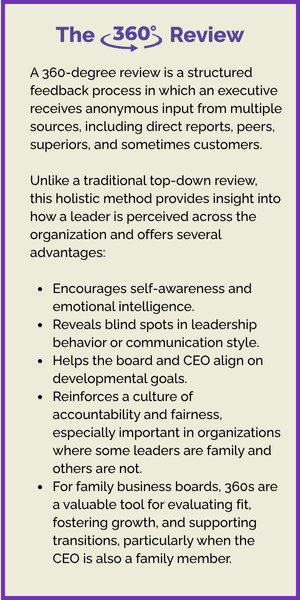A family business board’s active involvement can help ensure the company has the right leadership in place today and a strong pipeline for tomorrow. This article explores how boards can contribute in five areas — each illustrated with a case study drawn from family enterprise experiences: executive talent identification, leadership development, performance evaluation, succession planning, and executive recruitment.
Family Business Executive Talent Identification and Assessment
When a mid-sized manufacturing company began searching for its next COO, the board led a rigorous effort to define the leadership criteria. The process revealed that the presumed internal heir, an energetic third-generation family member, lacked critical operational experience. Meanwhile, a long-serving non-family executive demonstrated strong alignment with the company’s values and a proven ability to lead operations. The board recommended a dual solution: the family member became Chief Customer Officer, enhancing brand and client relationships, while the non-family executive was promoted to COO. Two years later, profits grew, customer satisfaction improved, and both leaders flourished in roles suited to their strengths. The clarity provided by the board’s structured process helped avoid a painful mismatch and fostered mutual respect between family and non-family leaders.
One of the board’s vital responsibilities is identifying capable leaders, whether they come from the family, from other parts of the company, or from external sources. Independent directors add essential objectivity to the process. They provide a reality check on the skills and qualities needed in leadership, beyond the familiar faces and legacy assumptions of the family. Independent directors broaden perspective, bring insights from their experiences in other companies, and ensure that sensitive transitions like CEO succession are set up to succeed.
One important role of the board is to help define what the company needs in future leaders. Independent directors, drawing on their broad business experience, see that promising successors are identified and help outline the capabilities needed for success. Acting as an experienced sounding board, independent directors can help uncover leadership roles without a ready successor or identify weaknesses that need strengthening.
By flagging issues early, the board can help ensure the company is not caught off guard by a sudden departure. Boards can help weigh family talent versus external talent with a clear eye.
By defining clear criteria for leadership roles and benchmarking internal candidates against the broader talent market, the board helps ensure the company identifies effective leaders.
Next-Generation Leadership Development
A family distribution company’s board established a leadership pipeline with milestones for NextGen development. For one G4 family member, that meant supplementing marketing expertise with operations experience and executive coaching. Three years later, her comprehensive preparation through the structured program made her the successful choice for marketing director.
Beyond identifying talent, high-performing boards actively foster the development of future leaders in the family business. When NextGen family members are being groomed to lead, the board serves as both a support system and a source of accountability.
Boards rightly expect to see development plans for future leaders and hear regular progress updates. By setting benchmarks and scheduling check-ins, the board helps ensure that preparing successors is treated as a serious, strategic priority — and that the process does not drag on longer than necessary.
Family business boards help cultivate capable family leaders. Many family firms require young family members to gain outside work experience and prove themselves before entering the family business in a leadership track. A family employment policy developed by the family and reviewed by the board might mandate, for instance, a college degree and 4-5 years of successful external experience for any family member joining the company. Such policies, backed by the board, ensure that when a family heir comes aboard, they bring credibility, skills, and relevant experiences.
Independent directors themselves often take on mentoring and coaching roles with up-and-coming executives. As seasoned businesspeople, outside directors can serve as valuable role models and sounding boards. The board can create opportunities for independent directors to engage as mentors and guides. By building personal rapport and trust, directors give future leaders a safe channel to seek advice and perspective.
Another way boards support leadership growth is by encouraging external mentorship and education. If the company brings in an outside CEO as a bridge to the NextGen, the board should be explicit in charging the new CEO with developing family managers for the future. Outside coaches are often engaged to help in the development of family (or non-family) leaders who are new to their executive positions.
Family Business Executive Performance
A family vineyard’s independent directors noticed growing tension between the CEO’s traditional production approach and the next generation’s interest in sustainability initiatives. To address this, they implemented a balanced scorecard evaluation system. The first assessment showed the company had strong financial performance but was falling behind in innovation. Using these insights, the board facilitated a solution that allowed the next generation to lead new sustainable projects while maintaining the CEO’s support. This collaborative approach resulted in an award-winning line of organic wine along with outstanding financial performance.
A board’s duties include evaluating executive performance, and in a family business, this duty requires tact and rigor, especially if the CEO or other top executives are family members. Boards must find ways to objectively assess the CEO’s performance compared to agreed-upon goals, even when personal relationships or founder authority looms large. A multifaceted approach works best for evaluating a CEO’s effectiveness.
For instance, the board might implement a CEO performance scorecard tracking both quantitative metrics and qualitative goals aligned with the family’s vision, values, and business performance expectations.

Boards can incorporate a 360-degree feedback or other mechanisms to gauge cultural fit and leadership effectiveness. A 360-review allows the CEO’s direct reports and other key stakeholders to provide confidential input. Emotional intelligence — particularly self-awareness and relationship management — can greatly impact the potential for leadership success. A 360-degree review puts the board on the same side of the desk as the CEO, considering the feedback together and agreeing upon goals for improvement.
Independent directors play an important role in delivering candid feedback that family board members might shy away from giving. Independent directors with deft candor can show empathy for the family’s legacy and still speak up if unproductive habits are getting in the way of enterprise success.
Through regular performance feedback, the board reinforces a culture of meritocracy and accountability. Independent directors help ensure that family and non-family executives are both evaluated on cultural fit, competence, and results. Such a culture of meritocracy and accountability at the top can permeate throughout the organization.
The board sets a tone at the top by linking performance to rewards and succession. For example, tying CEO compensation to achieving strategic targets, and advancing family members (or any leader) into higher roles when they’ve proven themselves.
A board may conduct annual or bi-annual self-assessments and solicit feedback from other family shareholders on the extent to which the board is meeting expectations. By holding itself to high performance standards, the board leads by example, demonstrating to owners and management that everyone will be evaluated against what is best for the business.
Succession Tracking and Planning for Family Businesses
At a family-owned construction company, the independent directors broke through the CEO’s resistance to succession planning. The board established a three-year transition with specific milestones for two successors. When the CEO suffered a health crisis just one year into the process, the groundwork was already in place, preventing what could have been a leadership emergency.
Nowhere is the board’s role more pivotal in a family enterprise than in top leadership succession planning. Succession in a family business can be emotionally fraught and easily delayed. Yet, CEO succession planning and strategy oversight are the two most important roles of the board.
Many family businesses have no formal succession plan at all, often because the current CEO is reluctant to consider their eventual retirement. An effective board with independent directors can change this narrative by taking a proactive interest in overseeing succession planning and making it an ongoing priority.
Boards can help by raising the topic of succession early and diplomatically, before a crisis forces the issue. Independent directors are especially valuable in broaching succession with a resistant founder or older generation leader. Because they sit outside the family hierarchy, they can ask the “what if” questions that others might avoid: What is the retirement timeline? Who would run the business if you were “hit by a truck?”
By introducing these discussions in a neutral, professional way, the board creates a space where planning is about business continuity, not an erosion of the current CEO’s authority. The process often involves educating the family on the risks of not planning – for instance, pointing out that an unexpected health issue without a designated successor could threaten the company’s survival.
Once the conversation is underway, the board can encourage formalization of a succession plan that aligns with family goals and business needs. The plan can map out a process and identify potential successors (family or external) while outlining development steps or a transition timeline. Independent directors can help build consensus around the plan, ensuring that shareholders agree on a way of navigating into the future.
Succession planning is not a one-time event but a continuous process.
If there are multiple family members in contention or differing expectations, the board’s independent voice can help mediate and clarify the criteria for selection. Because independents are less likely to be afflicted by family politics, they can encourage a focus on what the business needs for the future. When a family-owned business has a succession plan only vaguely in mind, independent directors can be a catalyst for documenting and committing to it.
The result is that family and management work toward the same transition goal, and when the time comes to carry out a transition, the new leader has the legitimacy of the board’s backing. That reassures employees and other stakeholders that the choice was well-planned and validated.
Succession planning is not a one-time event but a continuous process. The board can regularly review the progress of an heir apparent or a pool of candidates. This ties closely with leadership development oversight: Are the potential successors reaching their development milestones? Does the timeline still make sense, or are adjustments appropriate? Board members will want to see tangible growth in the successors’ capabilities – for example, evidence that a NextGen family leader has successfully taken on greater operational responsibility or accomplished a key initiative.
The board keeps succession plans on their radar at all times and holds the family and executives accountable to it. A critical aspect is preparing for contingencies. The board can ask management to identify where sudden departures could cause turmoil – not just the CEO, but any mission-critical positions – and then develop emergency succession plans. Independent directors can help spot weak points (for instance, if only one person holds a key client relationship or technical skill) and encourage management to develop backup plans.
Executive Recruitment Strategies
A family electronics company’s board member personally recruited a talented executive, addressing her concerns about joining a family business through a special incentive plan and a formal technology governance charter. This approach succeeded because the board directly addressed the unique challenges of attracting talented, non-family executives. Her leadership resulted in a profitable new division that advanced the company’s innovation agenda and deepened its bench of capable executives.

When it comes to recruiting top executives, a board often plays a hands-on role, particularly when hiring a CEO or other C-suite leader from the outside. Selecting the right top leaders is one of the most consequential decisions a board makes, and the stakes are heightened by concerns of cultural fit and trust. Independent directors add value by expanding the company’s access to talent and ensuring a rigorous, unbiased selection. One advantage is that independent directors typically have extensive networks in the industry and beyond. Family firms can leverage those networks, for example, using a director’s personal connections to identify strong candidates for an open executive position
Many boards consider it part of their duty to help source and screen candidates for key roles, working alongside executive search firms or through their own contacts. This can be especially helpful if the company is not well known outside its region or industry. Independent board members can tap into a wider pool of talent.
A common concern in family businesses is how to lure high-caliber professional managers when they suspect the top spot may eventually go to a family member. Independent directors help address this by demonstrating the company’s commitment to professionalism and fairness. Simply having independent directors on the board sends a signal that the family welcomes outside expertise. A productive approach is for the board to be transparent about advancement pathways. For instance, if the next CEO role will likely be a family member, candidates for other executive roles are informed upfront so they have realistic expectations.
When hiring a CEO, the board spearheads the selection process. This includes seeing that job requirements are well defined, considering outside recruiter candidates, interviewing finalists, and ultimately approving the hire. External candidates are often considered even if a family successor is likely, as a way to benchmark talent and check the quality of talent available in the market versus internal candidates.
Independent directors act as a stabilizing force throughout the recruitment and onboarding process.
In cases where an external CEO is brought in, the board sees that they understand their mandate and are integrated with the owners, the board, and top leadership. The board often works with the new CEO to set performance goals. If the plan includes eventually transitioning leadership to a family member, the board makes certain the external CEO understands that developing and preparing the family successor is part of their responsibility.
Independent directors act as a stabilizing force throughout the recruitment and onboarding process. They reassure both the family and the incoming executive that each decision is being made in the company’s best interest with due diligence. The board can use its oversight of compensation and incentives to aid in recruiting and retaining a CEO and other top talent. By establishing a fair, competitive compensation structure, the board makes the company an appealing place to build a career. Independent-led compensation committees often ensure that family and non-family employees are on equal footing in salary and bonus plans, with family members gaining extra rewards only via distributions or dividends as owners.

When recruiting an outsider for a senior role, the board might approve special incentives – for example, a long-term incentive plan or even a minority equity stake – to secure the hire. Because independent directors have experience with market benchmarks, they are well-positioned to advise what it will take to attract the right candidate and to negotiate terms that align the executive’s goals with the family’s vision.
Key Takeaways: Family Business Board Leadership Essentials
A board with independent directors is a powerful asset for building a strong leadership team and ensuring smooth succession across generations. These boards add experience, discipline, and impartiality to processes that families might otherwise handle informally or emotionally. Boards play multiple complementary roles. They help:
- Identify leadership needs and high-potential individuals early
- Champion leadership development by holding current leaders accountable for grooming the NextGen and often by mentoring future executives directly
- Encourage performance accountability at the top through structured evaluations and candid feedback
- Inspire and monitor succession plans so that CEO transitions are well-planned and aligned with the company’s long-term interests
- Leverage networks to bring in the right people when the family firm needs outside help
- Mitigate leadership risks by identifying gaps and preparing for sudden departures
The presence of independent directors creates a culture of professionalism and meritocracy. Family members are more likely to set aside personal biases when independents are in the room, focusing instead on what’s best for the business.
The board often serves as a bridge between family and business interests, mediating conflicts and ensuring that decisions like who becomes CEO earn stakeholder support and make business sense.
Effective family business boards look ahead: they are constantly scanning for leadership risks and preparing the company for long-term continuity. Independent directors help create an environment where the family business can prosper for generations.
August 5, 2025

